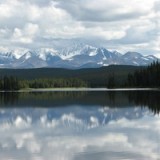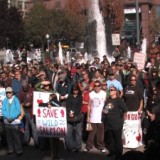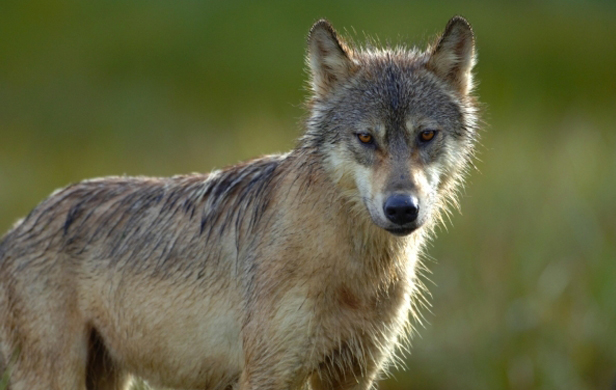This province is facing the battle of all battles over the using of Fish Lake and over Enbridge’s proposed Gateway pipeline, which would carry oil from the oil sands to the B.C. coast for export by tanker to Asian markets. I want to deal with Fish Lake in this column but will deal with the pipeline and tanker traffic in future columns.
Taseko Mines Ltd proposes a mine which would completely destroy Fish Lake. The plan for the mine would create a dam for the waste rock and tailings just above the Lake on Fish Creek. This would basically destroy both and fill the area with toxic waste. Because of the proximity to Taseko River, a major salmon bearing river, a leak of this toxic waste deposit would also affect fish not only in the local area but on a much bigger scale.
Fish Lake is near Ts’il?os Provincial Park, and falls within the traditional territory of the Tsilhqot’in Nation (Nemiah Band). The lake contains an estimated 85,000 rainbow trout, of which around 4,500-5,000 are caught annually.
Taseko’s plans are much assisted by a section of “tailing impoundment areas”. Taseko, bless their little hearts, proposes to build another lake to take the place of Fish Lake – all they ask is that we accept that they can make lakes equal to those made by the Creator or, for the godless, Mother Nature.
Chief Marilyn Baptiste of the Xeni Gwet’in First Nation on behalf of the Tsilhqot’in Nation, has filed a writ in B.C. Supreme Court seeking a declaration of an Aboriginal right to fish in Fish Lake, which is in the heart of Tsilhqot’in territory. For the Tsilhqot’in, the lake is sacred and its destruction unthinkable.
Taseko, of course, has a study to back their case. This report is by The Centre for Spatial Economics which by its mission statement “monitors and forecasts economic and demographic change throughout Canada at virtually all levels of geography.The Centre also prepares customized studies on the economic, industrial and community impacts of various fiscal and other policy changes, and develops customized impact and projection models for in-house client use. Our clients include government departments, crown corporations, manufacturers, retailers and real estate developers.“ (emphasis added)
Needless to say the report doesn’t concern itself about the “community impacts” on First Nations nor, looking at their clients, is impartiality their strong suit..
The question is not whether First Nations have the right to be consulted – that’s the law of Canada. The more interesting question is: does mere consultation itself become a license to proceed or do First Nations have the right to say “no”.
My instinct, gut feeling of a long retired lawyer, is that Taseko is going to get second prize and that, in any event, the cases will not be heard in the Supreme Court of Canada – which is where they will likely end up – for years. I wouldn’t be buying Taseko shares for short term profits.
I believe that there’s a need for British Columbians to cast aside hypocrisy and decide this: does economic development trump the environment? Is it a matter of how much a company can make – if it reaches a certain figure, the environment be damned?
Why do I talk about hypocrisy?
Because it underscores the issue.
Let me make three proposals – log Stanley Park, put apartment development on Little Mountain (Queen Elizabeth Park), and develop the hell out of Burns Bog with industrial parks, high density residence and private homes. Surely we must be prepared to make the same sacrifices the Tsilhqot’in Nation are asked to make and evaluate these places as economic developments.
In Stanley Park there will be the tree values of course and the employment provided loggers would no doubt last for several years. Then you have the prospect of huge land development. Not only is the area great for apartments think of the skyscrapers it would contain! And we could create a “virtual” park by insisting that all buildings have with trees painted on the exterior.
Little Mountain is probably the developer’s dream come true! Think of the views especially on the north, south and west faces! The taxes would be enormous!
Who wants a bog anyway? Aren’t they, by definition, pretty cruddy places? Merriam-Webster defines a bog as : wet spongy ground; especially : a poorly drained usually acid area rich in accumulated plant material, frequently surrounding a body of open water, and having a characteristic flora (as of sedges, heaths, and sphagnum). Leaving aside what sphagnum might be, surely, just like Fish Lake, Burns Bog is much more important for commercial purposes than just sitting there.
Is a lake with 85,000 fish in it or a bird sanctuary with nesting for migratory birds going to be permitted to stop progress, for God’s sake?
Let’s not forget Beacon Hill Park in Victoria – imagine the riches that would flow from developing that!
The reality is that because citizens in the Lower Mainland love Stanley Park, Queen Elizabeth Park and Burns Bog they will fight development nigh unto death which leads to one conclusion – citizens of Greater Vancouver are more important than the Tsilhqot’in Nation. The logical and not far off assumption from that, is that development trumps nature any time a developer can show that his projects will bring big bucks to the nearest town – unless, of course, it’s Vancouver or Victoria.
The argument by the estimable groups that support Stanley Park, Beacon Hill Park and the Burns Bog is that some things transcend economics and the making of profits and thus must be preserved for their social values. And, damn it, they are right!
If copper and gold was found in any of the parks I have mentioned or in Burns Bog, would the citizens let the miners in? Fat chance!
The Tsilhqot’in Nation feel about Fish Lake and surroundings as we in Vancouver Victoria feel about our natural treasures with this difference – Fish Lake is not just a park or a natural preserve to the Tsilhqot’in Nation, it’s part of their history, culture and a source of their food.
If we can’t respect their rights how can we dare stand up for ours?
Blue Gold: The Tsilhqot’in Fight for Teztan Biny (Fish Lake) from Susan Smitten on Vimeo.





